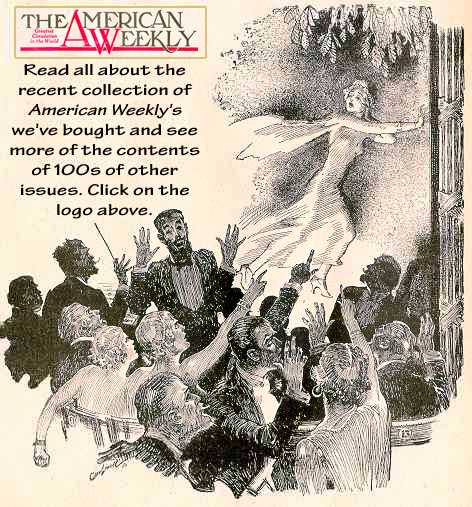


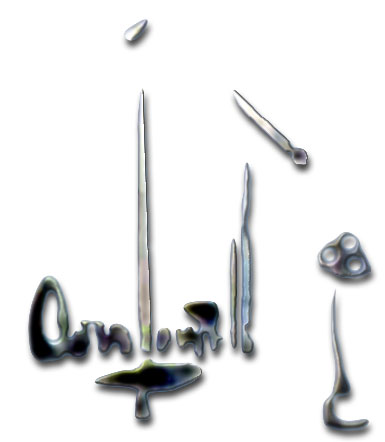
|
See Orson Lowell in issue 2 & 9 of See 15 pages of Lowell in #s 1, 2, & 4 |
Every time I approach an Orson Lowell pen drawing, I'm struck by the texture and surface he creates. It's simply impossible to reproduce the elegance of fine line pen & ink at 72 dpi on a monitor screen, but Lowell's work is worth an effort.
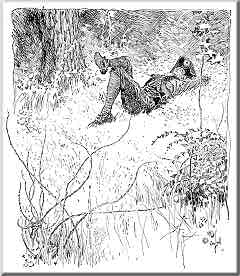
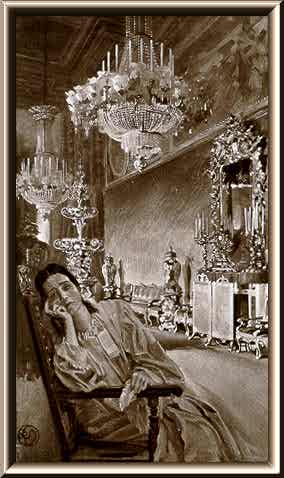 The son
of Milton Lowell, an artist who specialized in New England landscapes,
Orson was born in 1871. He was a contemporary of C.D. Gibson and
is almost always described in terms of Gibson's work. I actually
prefer Lowell to Gibson. He was every bit as facile and his line
work was more intricate and interesting. He created textures with
a seeming abstraction of lines that meld like fine brushstrokes
on an Impressionist's painting into a sum that belies the parts.
This distinctive style was attained using a variety of pen nibs
and brushes.
The son
of Milton Lowell, an artist who specialized in New England landscapes,
Orson was born in 1871. He was a contemporary of C.D. Gibson and
is almost always described in terms of Gibson's work. I actually
prefer Lowell to Gibson. He was every bit as facile and his line
work was more intricate and interesting. He created textures with
a seeming abstraction of lines that meld like fine brushstrokes
on an Impressionist's painting into a sum that belies the parts.
This distinctive style was attained using a variety of pen nibs
and brushes.
A hint of that can be seen at the left in one of more than 50 illustrations he did for The Choir Invisible in 1898, just five years after moving to New York from Chicago. He had studied at the Art Institute of Chicago under J.H. Vanderpoel, the noted anatomist.
In New York, he soon joined the staff of the old Life
magazine, a humor vehicle in competition with Punch and
Judge.
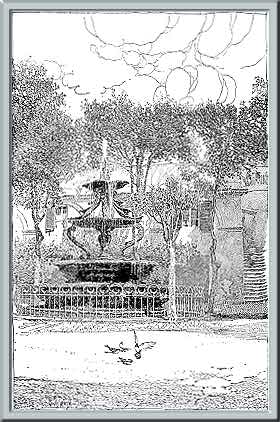 His masterpiece
was Saracinesca, a two-volume F. Marion Crawford extravaganza
from 1899. There must be at least 100 images (pen and ink and
photogravures of paintings) and they are easily some of his finest
work. The images of Italian fountains and ancient buildings and
bridges (samples left and below) were crafted with thousands of
ink lines yet glistened and sparkled with light and shape. I was
amazed when I first found this book and return to it often—and it was
a great source of images for the mailing envelopes when I was publishing a catalog of old books for sale. The photogravures
are equally breathtaking—images of ornate interiors and languid
women show that his mastery of form was equally at home with the
paint brush (see above right).
His masterpiece
was Saracinesca, a two-volume F. Marion Crawford extravaganza
from 1899. There must be at least 100 images (pen and ink and
photogravures of paintings) and they are easily some of his finest
work. The images of Italian fountains and ancient buildings and
bridges (samples left and below) were crafted with thousands of
ink lines yet glistened and sparkled with light and shape. I was
amazed when I first found this book and return to it often—and it was
a great source of images for the mailing envelopes when I was publishing a catalog of old books for sale. The photogravures
are equally breathtaking—images of ornate interiors and languid
women show that his mastery of form was equally at home with the
paint brush (see above right).
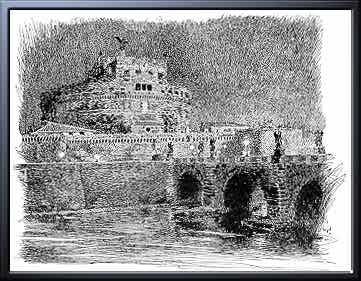
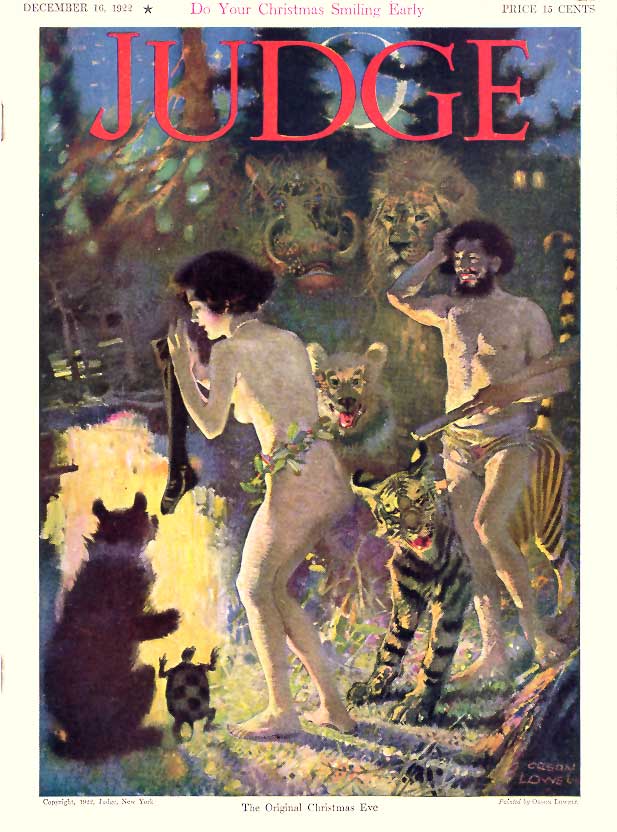 Life,
Judge, The American Girl and other magazines provided Lowell
with outlets for his work through the 1940's. A wonderful Judge
cover from 1922 is at right. He seemed to have a great sense of humor
as well as being a marvelous penman. His book work tapered off
as the market for illustrated novels diminished in the early 1920's.
But, perseverance pays off. In a collection of 600 issues of
The American Weekly, I found ONE Lowell drawing from 1933.
I share it with you below.
Life,
Judge, The American Girl and other magazines provided Lowell
with outlets for his work through the 1940's. A wonderful Judge
cover from 1922 is at right. He seemed to have a great sense of humor
as well as being a marvelous penman. His book work tapered off
as the market for illustrated novels diminished in the early 1920's.
But, perseverance pays off. In a collection of 600 issues of
The American Weekly, I found ONE Lowell drawing from 1933.
I share it with you below.
Other samples of his work can be found in:
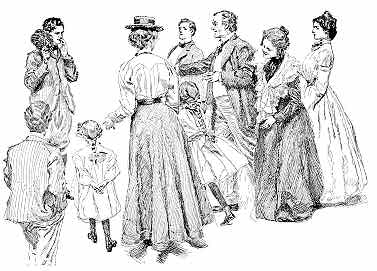 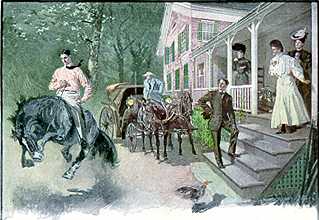
|
A Bicycle of Cathay at left was done in 1900 and was another great example of his pen work. Many other titles and many magazine illustrations followed in the first decade of the 20th century. The unusual color piece is from a C.N. and A.M. Williamson potboiler titled Lady Betty Across the Water. The two gentlemen seated below is from Love in Old Cloathes, 1896. 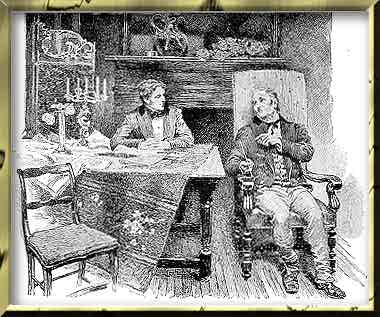 |
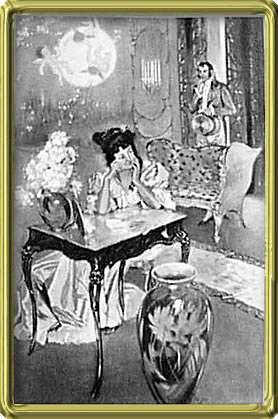 |
An uncommon and seldom seen outlet was in a multi-volume set
of the works of Charles de Kock. The woman at the writing table
at left is from Volume 11, Monsieur DuPont.
The best source for Lowell's most intricate work is Life. Should you get the opportunity, check out his masterful efforts done in service of comedy. He had few equals. Clement Coll would qualify and Gibson comes close. Lowell died in 1956.He was the second artist to appear in the ImageS InkSpot - the section of the color magazine where I devote a few pages to the magic of pen and ink. |

To ind out more about Orson Lowell, see:
| The Illustrator in America 1880-1980 | Walt and Roger Reed, 1984 Madison Square Press |
| 200 Years of American Illustration | Henry Pitz, 1977 Random House |
| American Illustration - The Collection of the Delaware Art Museum | Rowland Elzea, 1991 Delaware Art Museum |
| The Vadeboncoeur Collection of Knowledge | Jim Vadeboncoeur, Jr. 1997 |
| The Vadeboncoeur Collection of ImageS 2, 9 B&W ImageS 1, 2, 4 | Jim Vadeboncoeur, Jr. 2001, 02, 04, 07, 08 JVJ Publishing |
|
Illustrations copyright by their respective owners. This page written, designed & © 1997 by Jim Vadeboncoeur, Jr. Updated 2011. |
